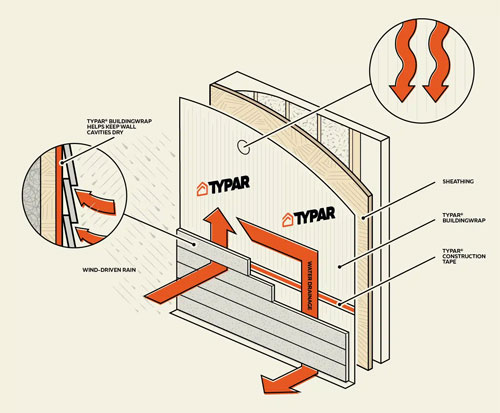Is House Wrap Necessary? 4 Things to Tell Your Customers/Homeowner

Most builders and distributors are very clear on whether or not house wrap is necessary (Yes. It’s necessary), but as your customers/owners face the rising costs of construction materials, you, as the builder/distributor, are likely to face pushback from owners who are looking for opportunities to cut costs.
When faced with this question, in many cases, the answer is simple: it’s required by the code. However, in some locations, the code doesn’t require house wrap (and sometimes even when required), owners will want more information about why it’s necessary.
- What is House Wrap: House wrap is the outer component of a wall system that serves as a vapor barrier, preventing water ingress into the interior components of the wall system. Water penetration into the interior wall system can cause mold, hinder the efficacy of the products (for example, wet insulation has significantly diminished thermal resistance), and even pose safety hazards in or around electrical components.
- It’s Not Just for Construction: Most owners have seen house wrap only during construction, leading to the common misconception that it is only necessary to protect materials from the elements while the building is being built. As discussed in number one, house wrap protects the walls both during and after construction.
- Siding is Breathable: By design, siding is breathable. This is for two reasons: 1) should water get behind the siding, it will need a way to escape, and 2) temperature differences between the siding and the interior wall system can lead to condensation buildup. This water needs a way to exit the system, and as a result, the siding has to be breathable.
- House Wrap Can Serve as an Air Barrier: When properly installed, house wrap is a fully sealed system. This means it can serve as an air barrier. This improves the energy efficiency of the building as it isn’t losing conditioned air to open air. It is worth noting that while a properly installed house wrap can contribute to a more energy-efficient structure, house wrap should not be relied upon to replace the air barrier.
While the cost of construction materials has many owners looking for opportunities to reduce costs, it is essential for builders and distributors to emphasize the necessity and benefits of house wrap. Not only does it meet code requirements in many areas, but it also provides long-term benefits in terms of protecting the integrity of the wall system, promoting energy efficiency, and safeguarding the overall durability and safety of the building. By understanding the importance of house wrap and effectively communicating its benefits, builders, and distributors can ensure that their customers make informed decisions that prioritize the long-term well-being of their homes or structures.
